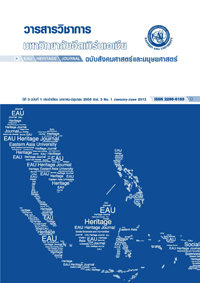การวิเคราะห์ปัจจัยที่ส่งผลต่อความสำเร็จของการปฏิบัติตามนโยบายการประกันคุณภาพการศึกษาของสถานศึกษาขั้นพื้นฐาน ในสังกัดกรุงเทพมหานคร
Keywords:
ปัจจัยนโยบาย, ความสำเร็จของการนำนโยบายไปปฏิบัติ, การประกันคุณภาพการศึกษา, สถานศึกษาขั้นพื้นฐาน, policy factors, success of policy implementation, educational quality assurance, basic educational schoolsAbstract
การวิจัยนี้มีวัตถุประสงค์หลักเพื่อการวิเคราะห์เส้นทางความสัมพันธ์ระหว่างปัจจัยนโยบายกับความสำเร็จ ของการปฏิบัติตามนโยบายการประกันคุณภาพการศึกษาของกรุงเทพมหานคร กลุ่มตัวอย่าง ประกอบด้วย บุคลากร และคณะกรรมการสถานศึกษาขั้นพื้นฐาน จำนวน 917 คน จาก 161 โรงเรียน ซึ่งเป็นหน่วยส่มุ กล่มุ ตัวอย่างแบบเจาะจง เครื่องมือที่ใช้ในการวิจัยเป็นแบบสอบถาม สถิติที่ใช้ในการวิเคราะห์และนำเสนอข้อมูล ได้แก่ ค่าเฉลี่ย ความเบี่ยงเบน มาตรฐาน การวิเคราะห์พหุคูณถดถอย และการวิเคราะห์เส้นทางแบบมีตัวแปรแฝงของปัจจัยนโยบายที่ส่งผล หรือมีอิทธิพลต่อความสำเร็จของนโยบายโดยใช้โปรแกรมลิสเรล ผลการวิจัยพบว่า (1) ปัจจัยนโยบายโดยรวม ทุกปัจจัยมีความสัมพันธ์ และสามารถพยากรณ์ความสำเร็จของการนำนโยบายการประกันคุณภาพการศึกษา ไปปฏิบัติได้ ร้อยละ 55 และ (2) ความสำเร็จของการปฎิบัติตามนโยบายการประกันคุณภาพการศึกษาได้รับ อิทธิพลโดยตรงจากทุกปัจจัยนโยบาย โดยปัจจัยมาตรฐานและวัตถุประสงค์นโยบาย และปัจจัยทัศนคติของผู้นำ นโยบายไปปฏิบัติมีอิทธิพลทางตรง โดยไม่ส่งผ่านปัจจัยนโยบายอื่น ส่วนปัจจัยทางเศรษฐกิจ สังคม และการเมือง ทรัพยากรนโยบาย และปัจจัยคุณลักษณะ และความ สามารถของผู้นำนโยบายไปปฏิบัตินอกจากมีอิทธิพลทางตรง ต่อความสำเร็จของนโยบายแล้วยังมีอิทธิพลทางอ้อมต่อความสำเร็จของการปฏิบัติตามนโยบายการประกันคุณภาพ การศึกษาของกรุงเทพมหานคร
The Analysis of Factors Affecting the Success of Education Quality Assurance
Policy Implementation in Basic Education Schools under the Bangkok Metropolitan Administration





